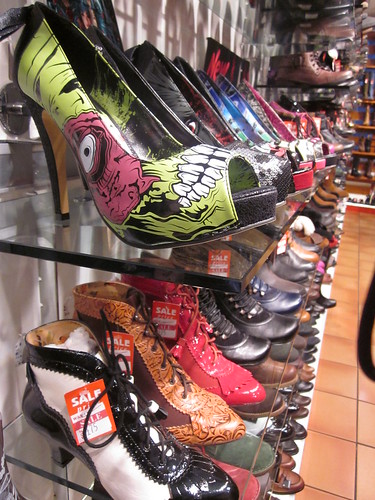What Makes a Smart Wine Buyer? Part 1
Know your brand.
When I ask, “What makes a smart wine buyer?” I do not mean, a person that goes into a wine shop to buy wine. I am referring to the person who purchases the wine for the shop, restaurant or bar. The wine buyer is a position so essential to any business that deals with a beverage program. Just like the buyer for Nordstroms, this person needs to be well versed in what they are purchasing and why. I have seen time and time again, businesses which do not take this position seriously. Many shop, bar and restaurant owners allow their employees to do the purchasing, because it frees them up to run their businesses. What some owners forget, is that purchasing merchandise is one of the most important aspects of their business.
Imagine if Nordstrom let their employees in the shoe department do the purchasing. Each employee has their own personal style and probably would buy according to their likes and dislikes. This would leave the shoe department in a hodge-podge miss-matched mess of shoes, boots, sandals and slippers. There would not be a cohesive, “Nordstrom style”. Nordstrom would never allow this, since they are a brand. Their brand has been created, marketed and requires talented people to continue keeping the brand fresh, modern and true to itself.
Shop, bar and restaurant owners should use this as an example in running their businesses. Sure, their shops may not be in every state and does not have the pedigree of Nordstroms, However each business should brand itself. Whether it brands itself as a dive bar or as an upscale Italian restaurant, it needs to be true to its brand. Where many businesses fail, is the lack of focus on branding themselves. The role of the wine buyer is to help brand the business.
The wine buyer is responsible for selecting the wines that the shop, bar or restaurant is going to sell. The merchandise is the bread and butter of the business. The wine buyer should be well aware of the finances of the business. Many owners keep this hush-hush. Unfortunately, this can lead to a wine buyer making ignorant choices. Understanding the business finances helps the buyer stay within a budget. It allows the buyer to make choices of when to buy and when not to buy. I know that many distributors and brokers would appreciate this. The most common frustration for any one on the wholesale side is collecting payments. If the wine buyer is aware of the business’ finances, then they can make purchases when there is money in the bank. This allows the vendors to get paid and for the business to stay in good standing with their vendor accounts. Vendors talk, and you do not want to be known as the guy who doesn’t pay.
A good wine buyer needs to be aware of his inventory. So many times, inventories get out of hand. The buyer might go on a shopping spree with wines that are not going to move. Many times businesses have inventory issues, and lose track of what they have in stock. Inventory is $$$! It is money just sitting there. If the wine buyer does not move inventory, then the business has pretty much thrown money out the window. Sure, wines sit around because they are there to build up a wine list’s pedigree or need to age. However, I see that many times there are the onesies and twosies that sit around because they have gotten lost in the vastness of the wine cellar. A good wine buyer needs to be organized. An organized buyer can keep track of what is on hand and its value. Staying organized will allow the buyer to move through product by recommending it to guests and to other staff members.
A good wine buyer purchases with the brand in mind. The brand of the business is usually determined by the owner. Did they open an Italian restaurant, an Argentinian wine shop or a dive bar? Whatever the business model is, that should be the focus of the wine buyer. Many times wine buyers buy what they like. Purchasing to personal preferences alienates a huge portion of clients. Everyone has a different palate, and everyone has their own likes and dislikes. You cannot please everyone, but if you stay true to the brand of the business you will be better in tune with your clients.
Take such as, the Italian restaurant. Obviously you buy Italian wines. However, what if your clients are not well informed on Italian wines and are more familiar with New World wines. Stay true to the brand. Create a list that features Italian wines, however, throw in some New World Italian varietals as bridge for the New World palates. You do not need to include the big name Napa Cabernets, but you can feature some of those winemaker’s Sangioveses or other Italian grapes. You have now opened the door to Italy for those who might not be so familiar. The next bottle they buy might be Italian.
Purchasing to your taste is also dangerous in this revolving business. Managers, wine buyers and servers come and go. If the business does not enforce the branding of the business with their purchaser, then they risk being all over the board. As an inventory grows and changes with the revolving door of wine buyers; the business can be left with a mis-matched wine program. As a wine buyer, you are not there to buy your favorite wines, rather to discern the quality of wine and make sure that it matches the business’ brand. Egos can run wild, especially when it is not your money. As a business owner, pull the reigns on your buyer. Make sure that their purchases are true to your business and that their focus is on quality and not their personal wish list.
Let’s go back to the question, “What makes a good wine buyer?” It is not a simple answer. A good wine buyer starts with a good owner. An owner who has an established brand and seeks a person who will be true to that brand. A good wine buyer should be an organized and open-minded person who, along with the owner, has the common goal of the business in mind. The buyer should buy according to what the business needs, and not so much what that person prefers. The buyer needs to have a good knowledge of the basic elements of wine and be able to discern proper price and quality. Ultimately, a smart wine buyer is there to build the business and aid in its branding by selecting the proper wines for the establishment.












